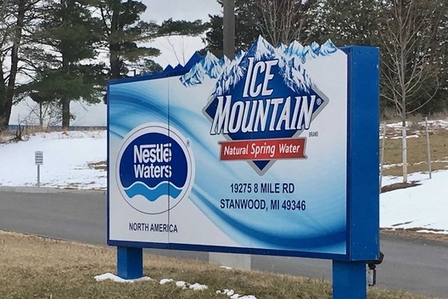The past month delivered some wins for the Huron and water throughout the state, including a court ruling limiting Nestle’s bottled water withdrawals, the advancement of state PFAS standards to public comment, and the update of a nutrient control policy for Ford and Belleville Lakes. Beyond these hopeful headline, state and local governments are also considering new opportunities to preserve land and water quality.

Public hearings set for Michigan PFAS drinking water limits
The Michigan Department of Environment, Great Lakes, and Energy has set dates for three public hearings in early 2020 concerning its proposed standards for a suite of PFAS chemicals. The scheduled hearings will take place in Grand Rapids on January 8, Ann Arbor on January 14, and Roscommon on January 16. The public has until January 31, 2020 to provide comments on the draft rules which are expected to be adopted in the spring of 2020.
Court rejects plan for bottle water pump building
Michigan’s Court of Appeals blocked Nestle’s plans to expand its water-bottling operations on the west side of the state, ruling that bottling and selling water is “not an essential public service” nor was it in compliance with zoning laws. The legal challenge arose following a proposal to increase the gallons per minute withdrawal at Nestle’s Osceola County wellhead from 250 to 400.
USEPA Approves Updated Ford and Belleville Lakes TMDL – No linked story
The U.S. Environmental Protection Agency has given the state’s Department of Environment, Great Lakes, and Energy the green light on its updated Total Maximum Daily Load for Ford and Belleville Lakes, two impoundments on the Huron River. The new TMDL, which replaces the previous 2004 version, lowers the phosphorus target for area municipalities and wastewater treatment plants. In lowering the nutrients flowing into the lakes, the policy aims to reduce the prevalence of eutrophication and harmful algal blooms.
Lyon Township considers buying property development rights to conserve land, slow growth
Officials in Lyon Township are considering opportunities to slow rapid and high-density community growth through the purchase of property development rights. The first step, currently under consideration by the Lyon Township board, is a property development rights ordinance, which gives property owners an option to preserve existing farmland and open space upon sale or transfer. Such steps allow for communities to invest in the immense ecological and water quality services provided by open and natural lands.
Michigan proposes new controls on farm animal waste
Industrial scale agricultural manure application is currently under revision by the Michigan Department of Environment, Great Lakes, and Energy. The revised controls, updated through the state’s general permit program for concentrated animal feeding operations, seek to limit the spread of manure in the first three months of the calendar year to reduce nutrient runoff into local waterways.
Report: Michigan’s water infrastructure needs $12.2 billion worth of upgrades
A new report published by Environmental Entrepreneurs (E2), outlines and quantifies the widening gap in Michigan’s water infrastructure investment. The assessment gives Michigan’s drinking, storm, and waste water systems low or near-failing grades. As outlined, Michigan has “chronically underinvested in essential water infrastructure,” leaving the state’s aging infrastructure increasingly compromised.



